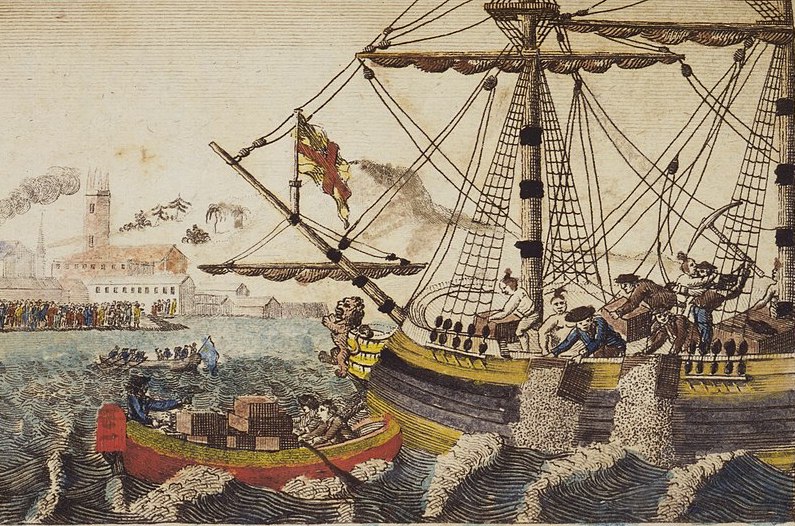Bring Your Sugar Cubes, Patriots, We’re Going To Make a New Kettle of Tea Out of Boston Harbor
The 250th anniversary of the protest by the Sons of Liberty against the tax on ‘that baneful weed’ is set for Saturday in the same waters where the revolution began to brew in 1773.

On Saturday, America will commemorate the 250th anniversary of the Sons of Liberty throwing tea into Boston Harbor to protest a tax imposed by King George III. It was a major step on the road to independence. The event will feature an unprecedented reenactment to celebrate the patriots’ defiance.
The Boston Tea Party Board of Advisors and Revolution 250 has dedicated itself to encouraging Americans to connect with the founding generation on this anniversary. It is stressing the principles of civic engagement, representation, protest, and commemoration.
Throughout the school year, the Boston Tea Party Ships & Museum writes in a statement, “students are encouraged to express their personal thoughts and connections” to the rebellion.” Plus, too, they are also invited to donate loose-leaf tea.
At Saturday’s events, the tea will be tossed into Boston Harbor. The performance will cap off reenactments at the Old South Meeting House and Faneuil Hall, which will again ring with the spirited arguments for liberty made in 1773.
The American Revolution was unique in history, an uprising by the wealthy rather than against them. The 56 men who signed the Declaration of Independence all enjoyed — and deserved — privilege. They took nothing for granted, and had more to lose than gain from resisting the crown.

The anger began brewing in May 1773, when Parliament passed the Tea Act. The legislation charged colonists extra but included loopholes for those with the king’s favor. The British East India Company, say, could sell the product without any extra excise.
All tea was subject to taxes imposed by the Townshend Acts. The Sons of Liberty opposed those, too. The East India carveout compounded the insult and sparked an act of civil disobedience heard ‘round the world.
Colonists resented having to fill the king’s coffers while others got off scot-free, a term itself derived from the Scandinavian word for tax — “scat.” When the East India ships reached Griffin’s Wharf, the future first lady, Abigail Adams, signaled her disgust. “The tea,” she said, “that baneful weed, is arrived.”
So the Sons of Liberty — some disguised in Native American garb — boarded the ships and sent the entire 250-pound shipment overboard. It was the first act of defiance against the crown, putting teeth into the slogan “No taxation without representation.”
It didn’t matter that the Sons of Liberty could afford the three-penny tax — equal to about $1 in today’s debased greenbacks — per pound of tea. The upper level of colonial society held the beverage sacred, using it to demonstrate hospitality and status. Infringing on it was an affront.
One of Colonial Williamsburg’s speakers, Christian Di Spigna — whom I interviewed about his book, “Founding Martyr: The Life and Death of Dr. Joseph Warren, the American Revolution’s Lost Hero” — told me how the protest was planned in secret at great risk.
“Warren,” Mr. Di Spigna said, “was one of the main architects of the Boston Tea Party.” Known as “the Grand Master,” he “presided over all the clandestine meetings held at the Green Dragon Tavern, ‘Headquarters of the American Revolution’” and later fell for his country at Bunker Hill.
The insurrection at the Harbor, called treason by the king, sent a clear message across the ocean. American subjects would only abide by laws passed by representatives they had elected, not those imposed by king and parliament in far-off London.
The patriots’ ideals have grown blurry in modern America, where taxes are now imposed at an extraordinary level, and power is exercised from Washington in degrees that would be unimaginable to our Revolutionary Fathers.
In 1909, when a reader wrote the Sun with concerns that “constitutional liberty is well-nigh extinct,” he invoked the Boston Tea Party, praising how “colonists waged war with their kin across the seas for the sake of a principle.” In 2009, the Tea Party movement protested high taxation with similar language.
As Americans focus on present troubles and reexamine the past, the Boston Tea Party stands as a timeless example. Today, they may prefer coffee over tea, but Saturday is an occasion to raise a cup of “that baneful weed” and recall the pivotal role it played in launching our nation.

